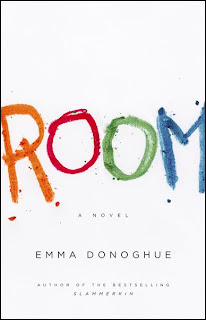what i read in january
 Some months I want to give everything I read a solid B. January was not one of those months. Here are my three fascinations (not counting The False Friend, which I loooved and already told you about) and one hate.
Some months I want to give everything I read a solid B. January was not one of those months. Here are my three fascinations (not counting The False Friend, which I loooved and already told you about) and one hate.Room by Emma Donoghue: You might think an entire book narrated by a five-year-old would be precious and grating, but Emma Donoghue pulls it off. She's also written a thriller with a simple premise: boy and mother trapped in a room; he's never known anything else, but she wants a realer life for both of them. It's completely addictive, suspenseful, sweet and funny, with lovely fairytale allusions that prove Donoghue hasn't abandoned her Kissing the Witch inspirations. Oh, and Room also manages to muse on the meanings of consciousness, reality and self-hood in a waaaay more interesting form than most of what I read in grad school.
Impossible Motherhood by Irene Vilar: I read this on the heels of A Million Little Pieces, and I found it as opposite as a memoir can be (which, if you've read my review of A Million Little Pieces, you know is a good thing). It's deeply reflective and quietly poetic. It's slightly nonlinear, and I did find myself having to retrace my steps to get the who-what-when at times, but I appreciated Vilar's ability to approach her subject matter from different angles. Her story is brutal on its face--15 abortions in 15 years--and both more brutal and more understandable upon the close examination she gives it. Impossible Motherhood is a story of inflicting other stories on the body, and of slowly finding a way out. I loved the scene where Irene learns to nurture by caring for her dying dog, and I was thankful that the possible motherhood she finally depicts wasn't painted as an easy cure for a lifetime of struggle, as certain celebrity mommy testimonies would have you believe.
Flash by Jim Miller: Reading this novel, about a journalist who becomes obsessed with an old Wobbly named Bobby Flash (Wobblies were IWW workers, who caused a stir in San Diego in the early twentieth century), I got the impression that Jim Miller moves through a city much like I do: seeing the past as a ghostly imprint over the present, falling in love with cultural idiosyncrasies, wondering what my history classes never taught me. There's an interesting tension in Flash between artistic individualism and social-justice collectivism which plays out as journalist Jack bumps up against organizers and activists but never quite joins them. His dreamy loneliness is compounded by his semi-estrangement from his grown son and the gaps in his family history. But as his research reveals, the pursuits of individual and communal happiness aren't mutually exclusive. This book is a must-read for history geeks, labor advocates, Southern Californians, people intrigued by alternative communities, and border dwellers in all senses of the phrase.
A Million Little Pieces by James Frey: Of all the reactions I expected to have to this book, "boredom with frequent dashes of extreme annoyance" wasn't among them. Oprah, you deserve better, and by "better," I don't mean truth. You deserve competent prose, not verbal ticks trying to pass themselves off as literary-ness. Someone needs to introduce Frey to the serial comma. Also, it's bad enough to write a stock sentence. To repeat it over and over again for emphasis is unforgivable. Oprah, you've been through some crazy-ass shit in your life, so you know that a ten-minute conversation with Dr. Phil contains more self-reflection than this memoir-slash-novel.
Despite positively portraying characters who function pretty much as 12-step information pamphlets (except when they pause to be awed by how stubborn and hardcore the asshole protagonist is), Frey ultimately dismisses traditional processes in favor of JUST DECIDING NOT TO DRINK. (Oops, I think I just spoiled the lamest ending ever.) This book oozes ego, stupidity and hubris (or as Frey would say, "stupidity and stupidity and stupidity"). While I'm still trying to parse whether I hate James the fictional character, James the person-who-inherently-becomes-a-character-due-to-the-nature-of-narrative, or Frey the writer, one thing is certain: He owes Oprah and all of us an apology.



Comments
enough said.